- Home
- Michael Dobbs
Churchill's Triumph Page 3
Churchill's Triumph Read online
Page 3
The conference of the three Allied war leaders hadn’t yet started and already Stalin had won the first round.
“They call you the Holy Trinity, you three,” Sarah said, smiling, trying to reassure him.
“And Stalin says I’m the Holy Ghost,” he replied morosely, “because I’m the fool who seems to be forever flying about.” He scratched at a blob of grease on his lapel. “But I think we rather resemble the triumvirate of Ancient Rome—you remember your Shakespeare?”
“You know I prefer more modern pieces.”
“After the fall of Julius Caesar, the three of them—Mark Antony, Octavius, Lepidus—gathered together to carve up the world. Just like us. Then they fell upon each other’s throats.”
It was clear his spirits were not to be easily raised. They’d left Malta eight hours earlier, bound for their ultimate destination of Yalta on the coast of the Black Sea, which in February could freeze as hard as Iceland. The nearest operational airfield was Saki, although from five hundred feet up it seemed an utterly reckless place to land. As the four-engined Douglas Skymaster made its approach it gave another sharp lurch through the cold air and Sarah gripped her father more urgently. She wasn’t enjoying this, either. “Why couldn’t we have come by ship?” she moaned.
“My sentiments entirely, but the Germans departed the Crimea only a few months ago. They left behind a wasteland drenched in blood and a harbor packed with mines. Regrettably, the bastards failed to leave behind a map for their minefields. So, we endure.”
Then, at last, the tires were hitting the ground, squealing, once, twice, and the Skymaster was clawing slowly to a halt, bouncing on every rut. When finally the aircraft had stopped, Churchill was pensive, remaining in his seat for awhile, staring at the guard of honor lined up at the side of the field, lost in his misgivings.
Sarah waited for him, staring sadly at her father in the light of a winter’s afternoon. The sparse hair, the sagging jowls, the eyes that were losing the battle against time. He was an extraordinary man who seemed to possess an almost supernatural capacity for revival and for restarting the motor that had driven him full tilt through a lifetime of hazard, but the gears were now worn, they kept slipping, and each time he set out, the engine was forced to race ever harder to make any headway. Sarah knew why she’d been asked to accompany him to Yalta, for much the same reason as Roosevelt’s daughter, Anna, was also coming. For comfort, yes, to make sure their fathers had those little personal things around them that made them feel content, but although no one spoke about it, the daughters were also there just in case. To be by their sides, just in case anything were to happen. No man can easily contemplate the thought of dying far away from his home, on his own.
Yet there was still plenty of life left in the old dog. Suddenly he launched himself from his seat. “Let’s get on with it,” he muttered grimly.
The American president was waiting for him. Franklin Roosevelt had arrived on a plane some twenty minutes earlier and had been lowered in his wheelchair on a specially constructed lift. Now he was seated in the back of a Lend-Lease jeep, wrapped heavily against the cold as the two leaders set out to inspect the guard of honor together. Roosevelt looked frail, disinterested, and the prime minister tried to give the occasion some semblance of dignity by walking beside him. Afterwards they were taken to a tent heated by wood-burning stoves where their Soviet hosts had laid on a feast—suckling pig, caviar, smoked sturgeon, black bread, with endless quantities of vodka and the sweet local champagne. All the while, outside, the guard of honor continued to stand at its post, bayonets like icicles.
When, at last, Churchill climbed into the back of his car alongside Sarah, his mood had not improved. She left him to his thoughts. Of all the Churchill children, she resembled him most closely—the same intense blue eyes, gold-red hair, passionate temper, so stubborn she was known as “Mule.” It often made words superfluous between them and their silences were never painful. She tucked a rug round his legs and held his hand.
It would take them almost five hours to reach their destination. Yalta was barely more than eighty miles away but the road was slushy, rough, heavily potholed, with signs of hasty repair. At every two hundred paces they saw members of the Soviet militia, many of them women, saluting with their rifles as the convoy passed. And still it snowed.
“I am in agony about Franklin,” he began at last.
“I think we all are,” Sarah replied. “He looks so desperately ill.”
“He is also desperately misguided. Infirmity and imprudence. The combination could be calamitous. You know, I asked him if we might share the journey to Yalta. He declined. Said he needed to rest. He won’t talk to me, Mule. Has pushed me aside.”
“He couldn’t do that. You’re mistaken.”
“I am most certain of it.”
“Then why?”
“Because he thinks he knows better. Trusts Stalin. Believes we may all live together in harmony once the slaughter is over. He’s one of those most dangerous of men, Mule, an idealist. Thinks he can win over Stalin simply by the force of his own personality.”
“Don’t you?”
“Only if I’ve got a bloody grenade in my pocket.”
“But you’ve said such nice things about Marshal Stalin.”
“And I shall continue to do so. It’s called diplomacy, and it is filled with terminological inexactitudes.”
“Which means?”
He sighed, as though already exhausted. “In a few hours’ time I shall embrace the Marshal warmly and he, just as warmly, will embrace me. Doesn’t mean we like each other. Nearly thirty years ago I sent an army to Russia with the intention of crushing the Bolshevik infant in its cradle. I failed. Stalin hasn’t forgotten that. Neither have I.”
Ahead, they could see the terrain changing, rising into mountains. On both sides of the road were strewn the remnants of broken tanks and rusting military equipment, and as they passed through village after desolated village, not a single house appeared to be intact. They could see no livestock, no signs of preparation for the coming spring, only hungry eyes peering from the darkness of empty windows. This was the Crimea, still gripped in a German winter.
As the hours rolled and bumped past they tried to entertain themselves by reading aloud extracts from Byron and munching dry ham sandwiches, which they washed down with a little brandy. He always brought sandwiches with him to Russia; in this place you never knew what to expect. Then the brandy got the better of the old man’s constitution and he leaned forward to rattle at the partition window separating him from the driver and armed guard seated in front. “Stop the car,” Churchill ordered.
The guard shook his head, indicating that they should continue. A shouting match quickly developed that wasn’t resolved until Churchill grabbed the handle of the door and started to open it as though to jump out. “I need a leak, you fool,” he shouted, as the car drew over. “Just wait till you’re my age and they start bouncing your bladder over these bloody roads!”
As he stepped from the car he found himself in yet another graveyard of charred and tumbling walls. It was still snowing and the hamlet appeared deserted except for a couple of nervous dogs that barked from a safe distance. He could taste the air: it was still thick with brick dust, and there was the sense of something sweetly sour and rotted about this place, as though someone had taken the lid off an old dustbin. It was a smell he had carried with him from the trenches of the last war.
It wasn’t until Churchill had finished his business out of view of the car and was buttoning himself up that he saw two small children. A brother and sister, he guessed, the eldest no more than nine, rake-thin, with harshly cropped hair to ward off infestation and a threadbare horsehair blanket that was their only means of protection. Tears marked the girl’s cheeks but she made no sound. Their eyes spoke of horrors and their skin was so filthy it was impossible to know where bruises smudged into
old grime. Slowly, from beneath the blanket, the boy stretched out a hand and muttered a few words that Churchill did not understand.
“My poor lambs,” Churchill whispered. He began feverishly searching his pockets—for what he wasn’t certain, as he never carried any money—and while he fumbled the blanket fell from the children’s shoulders. Their bodies had become a canvas of sores, scars and infection, and where the girl’s left arm should have been there was nothing but a desperate, blackened stump. They had no shoes, the girl was clad in a sack and the boy was wearing a grey German field tunic that still bore its dark stain of death. His hand went to his mouth, begging for food, and Churchill cried out in anguish. He stepped forward, but as he did so they were gone, vanished into the grey gloom of snow. From nearby he heard the guard shouting in impatience; Churchill swore softly at him, didn’t move, couldn’t move, as tears trickled down his cheeks. When at last he had clambered back into the car and they were on their way once more, he said nothing for many miles.
Then they began to climb into the mountains. They made another stop, this one planned; another feast set out on groaning tables, with Soviet dignitaries—Molotov, the wretched foreign minister, and Vyshinsky, odious prosecutor—dancing attendance and insisting they eat. Churchill cursed the memory of the stale ham sandwiches and whispered urgently to his daughter. While he ate and engaged the attentions of his Soviet hosts, she busied herself on his errand.
By the time they were on their way once again the short winter day was drawing to its end. Sarah sat with two bulging canvas shoulder-bags at her feet. The old man squeezed her hand in gratitude, but said nothing. An hour further on they approached the ruins of another village. Firelight flickered between the cracks: there was life here, of sorts. Once again Churchill demanded that they stop, and this time Sarah joined him as he stepped from the car and disappeared into the shadows. When, a few minutes later, they returned, the guard failed to notice that they were no longer carrying their shoulder-bags, or that the rear compartment no longer smelled so strongly of suckling pig and smoked fish.
“It seems so desperately inadequate, Papa,” Sarah whispered.
“Of course it is.” He sobbed in genuine distress. “Everything I do nowadays seems so. But at least, Mule, we shall know that we tried, and that some good, no matter how little, has come from this wretched conference in Yalta.”
***
Elsewhere on the road, another car was bumping its way through the mountains.
“He really has degenerated, Anthony. He’s become just another silly old man. All over the place.”
“Winston, you mean?”
“It’s inexcusable. We travel halfway round the world to sort out the peace, yet Winston won’t even read the papers I give him. It really is a terrible shemozzle.”
“Shemozzle, indeed, Alec.”
The two men fell into silence, contemplating the dreariness of the scene outside the car. Anthony Eden, the foreign secretary, and Sir Alexander Cadogan, the permanent under-secretary, were, as so often in their careers, following some way behind Churchill. Neither found it a comfortable position. Eden was the suave and elegant politician, the diminutive and intellectual Cadogan his most senior official; both were quintessential figures of order, and they found it inconvenient and frequently exasperating to work for a prime minister who most evidently was not.
“He’s not the only one, of course, Alec. Look at the Americans. Half their delegation is dying on its feet—and Franklin looks like an impressionist picture that’s been left out in the rain. We should be holding this conference in the catacombs.”
“We need to stick a few pins in their rumps. Make sure they take a little guidance—”
“Our guidance.”
“Otherwise we’ll achieve nothing. These meetings are all the same. Our masters dine and our masters wine, which is all very well, but nobody knows what on earth has been settled—least of all themselves. Winston is the worst.”
“Oh, but he’s done so much.”
“Anthony, forgive me, but this is the most decisive point of the war. Everything we’ve fought for hangs upon this moment and upon this meeting. It’s no time for nostalgia.”
The foreign secretary sighed. “At times he does seem like an old ship with the wind torn from her sails. And the truth is, I never know when his heart will rule his head.”
“His heart always rules his head, Anthony! He has a couple of drinks and gets a little buffy, then he’s away on one of his great sentimental waves. Fine for music hall, less useful with Marshal Stalin, I fear.” The car hit one of the many hurriedly filled potholes that marked the road out of Saki and the civil servant bounced in his seat, shaking both his dignity and his natural reserve. His fingers brushed fretfully across his carefully trimmed moustache. “Frankly, Anthony, I shall be much happier when you’ve taken the reins.”
Eden sat quietly for a moment. There was no denying his ambition, or his ability—everyone said so. But it was better in such matters not to seem too keen.
“We’ve beaten him like a plough horse. I suppose he can’t go on for ever.”
A pause.
“You would be so much better, Anthony.”
Another pause.
“Thank you, Alec. I shant forget your devotion. We must all move on.”
“Well, since you mention it, I suppose you’ve realized. . . ”
“Come, Alec, you can confide in me.”
Cadogan stared out of the window. It was many moments before the words came. “Washington. I’d like Washington.”
“We already have an ambassador. There is no vacancy.”
“Neither is there at Number Ten, Anthony. But time will tell. And the Americans’ intellectual grip is about as thin as restaurant coffee. All grand phrases and foggy bottoms. No denying there’s a job to be done.”
“And you would be the man to do it.”
“It’s my turn to thank you.”
“All in good time, Alec. Everything in good time.”
The car bounced on, and they fell back into silence.
***
Frank Sawyers was having a difficult day, not that there was anything unusual in this. Every day in the service of Winston Churchill was a challenge. The British war leader was a demanding and often sharp-tongued taskmaster, who worked preposterous hours, indulged in extravagant appetites, and expected everything—and everyone—to work to his whim. As his valet, Sawyers was expected not only to put him to bed but also to be there to wake him up in the morning. It was therefore fortunate that Sawyers wasn’t married and was never likely to be, and that he had a sense of the ridiculous that enabled him to laugh through his master’s excesses when others, including well-salted admirals, battle-hardened generals, and gin-sodden cabinet ministers, simply wilted.
He wasn’t the best-looking fellow in the world, short, in his forties with a shining pink pate and a dominant lisp, but Sawyers was always meticulously turned out and set himself high standards. He also knew that Churchill couldn’t operate without him. Truth be told, he would have trouble getting dressed without him, and although Sawyers had never lifted a rifle in anger, he reckoned he’d done as much as many to win this war simply by keeping the old bugger going. He bore many scars from the Churchillian lash, but others recognized his abilities. At a dinner in the Kremlin the previous year, the Russian leader himself—Marshal Stealin’, as Sawyers liked to refer to him in his sibilant Cumberland accent—had toasted him, not once, but twice. Mind you, the Marshal had been more than halfway towards alcoholic oblivion so had probably mistaken him for a cabinet minister or, at very least, the Keeper of the King’s Closet. Now, there would be a job. . .
Sawyers was a servant, but in his own way a bit of a snob, so it helped him along his bumpy road to know that Churchill always insisted on the best—vintage champagne, hand-rolled Havanas, silk underwear. The problem was, the maste
r never quite found the means to pay for it all. To finance his lifestyle he would contract to a publisher to write another history but spend the advance long before its time, requiring him to undertake to write yet more histories to pay off his debts. As his literary agent used to say, rarely had so much been owed to so many. The histories would eventually be written, of course, and the advances earned several times over, but in the meantime, Sawyers had to be an excellent household manager, even something of a forager, and these skills were never in greater demand than during his first few days in the Crimea.
Yalta wouldn’t have looked out of place on the French Riviera. It sat in a natural amphitheatre that was crowned with forests of pine, and had grown into a seaside resort of elegant villas and promenades interwoven with rustling olives and small vineyards. But then the Wehrmacht had arrived. The desecration they had inflicted had been almost total, for what they had not ruined during its capture had been raped as they departed. Barely a window survived or a roof remained intact. It had become a land of memories, which made it all the more remarkable as the choice to host the most important gathering of the war, yet Stalin refused to travel outside the Soviet Union and Yalta, in February, was at least warm. As the road from Saki unwound in the lee of the mountains, snow and slush gave way to sweet, scented breezes fresh off the sea.
The three delegations—Russian, American and British—were to be housed in separate facilities. The Russians stayed at the Yusupov Palace in Koreiz while the Americans were placed nearby in the old tsarist summer palace called Livadia. The British, meanwhile, lodged nearly thirty minutes away, at the Vorontsov Palace. The Vorontsov was a strange confection of styles, a confusing mixture of Scottish baronial castle, moorish villa and Swiss chalet, perched on the heights at the southern tip of the Crimea from where it gazed out over the waters of the Black Sea like a cross-eyed bull. It had survived the carnage that had reduced the surrounding areas to wasteland only because Field Marshal von Manstein had made it his personal headquarters, yet even so, two weeks before Churchill was due to arrive, the Vorontsov had had nothing: no windows, no doors, neither plumbing nor furniture. But when Sawyers and the vanguard of the British party got there they discovered a stylish dining room, antique furniture, rare carpets, wall hangings, and many grand portraits. Every item had been shipped by rail from Moscow four days’ journey to the north. The linen was spotless, the flowers stood fresh in the vases, and goldfish swam once more in the stone pool of the orangery. They’d even replanted the gardens. No effort had been spared. The entire staff of the Hotel Metropol in Moscow had been conscripted and brought a thousand miles south to act as bed-makers and broom-wielders, rounded up in the middle of the night by the NKVD secret police and told to pack. Most of them had imagined they were headed for the gulags, not a holiday resort.

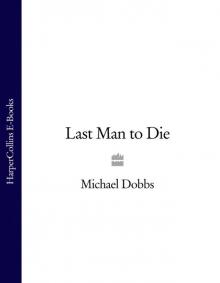 Last Man to Die
Last Man to Die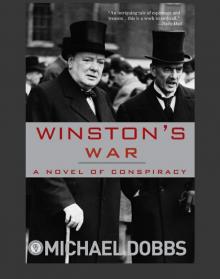 Winston's War
Winston's War The House of Cards Complete Trilogy
The House of Cards Complete Trilogy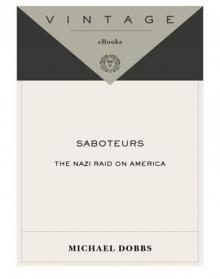 Saboteurs
Saboteurs The Touch of Innocents
The Touch of Innocents WC02 - Never Surrender
WC02 - Never Surrender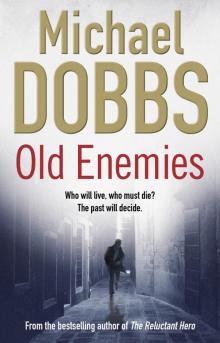 Old Enemies
Old Enemies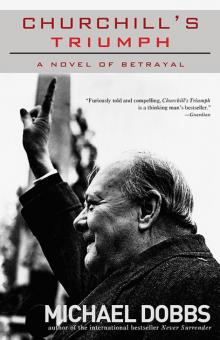 Churchill's Triumph
Churchill's Triumph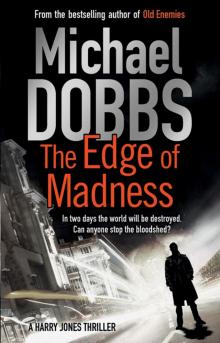 The Edge of Madness
The Edge of Madness Goodfellowe MP
Goodfellowe MP The Final Cut
The Final Cut Whispers of Betrayal
Whispers of Betrayal Churchill's Hour
Churchill's Hour The Buddha of Brewer Street
The Buddha of Brewer Street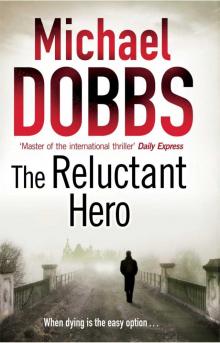 The Reluctant Hero
The Reluctant Hero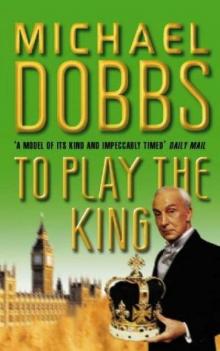 To Play the King
To Play the King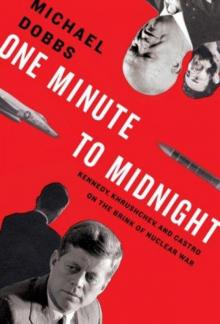 One minute to midnight
One minute to midnight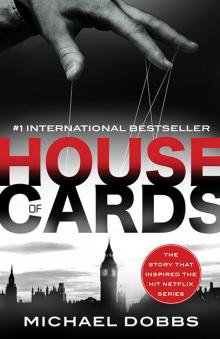 House of Cards
House of Cards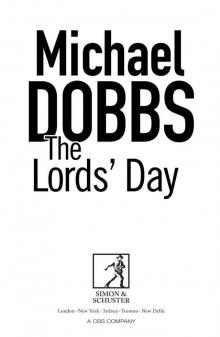 The Lords' Day (retail)
The Lords' Day (retail)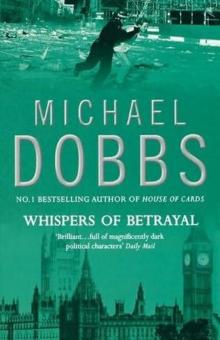 Whispers of betrayal tg-3
Whispers of betrayal tg-3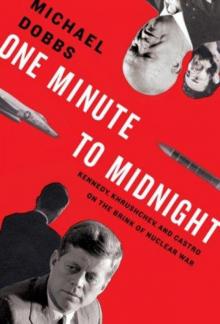 One minute to midnight: Kennedy, Khrushchev, and Castro on the brink of nuclear war
One minute to midnight: Kennedy, Khrushchev, and Castro on the brink of nuclear war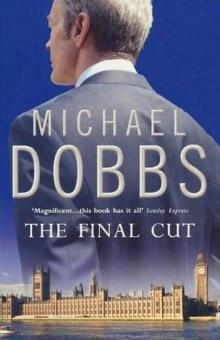 The Final Cut fu-3
The Final Cut fu-3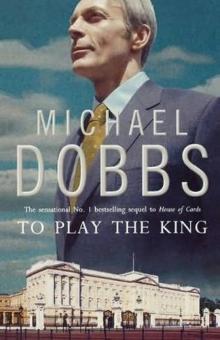 To play the king fu-2
To play the king fu-2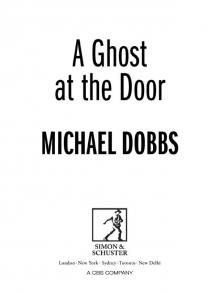 A Ghost at the Door
A Ghost at the Door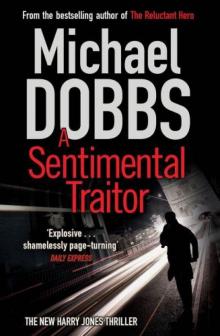 A Sentimental Traitor
A Sentimental Traitor